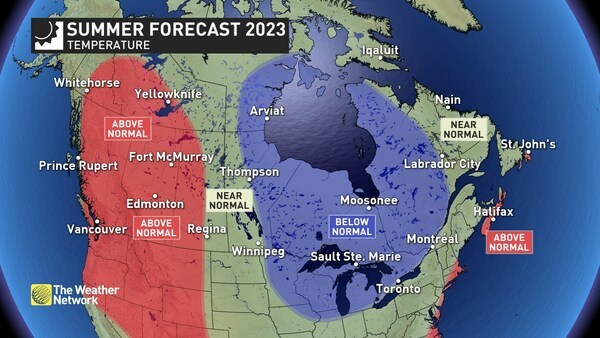With June finally upon us, it's time to embrace the arrival of summer and eagerly anticipate the adventures and experiences it holds.
Coinciding with the arrival of summer, The Weather Network, Canada's trusted source for weather information, has unveiled its highly anticipated 2023 weather forecast for June, July, and August.

According to the report, after three years of La Niña dominance, the weather patterns are finally undergoing a dramatic reversal as we transition into a moderate to potentially strong El Niño event. Brace yourselves for a "come and go" summer across Canada, characterized by alternating bouts of scorching heat and dry spells, intermingled with refreshing spells of cooler and unsettled weather.
"The global pattern is in a state of upheaval as we are seeing a rapid transition from an exceptionally persistent La Niña event to what appears to be a rather significant El Niño event," said Chris Scott, Chief Meteorologist with The Weather Network in a release.
"Therefore, our weather pattern this summer should be different from the past few summers with more changeable conditions. Overall, a cooler summer is expected, especially across the eastern half of Canada. However, we will still see some lingering effects from La Niña with periods of hot weather, especially across western Canada."
The report says droughts are a pressing concern in some areas this summer as the dominant storm track is projected to remain primarily south of the international border. However, the fluctuating weather pattern should bring occasional stormy conditions, reducing the risk of persistent widespread drought as we delve deeper into the season.

Here's what to expect from coast to coast:
British Columbia:
Get ready for a very warm summer, although the heat won't be as relentless as in previous years. Occasional breaks will provide relief with periods of cooler and unsettled weather. While the wildfire risk remains a concern, cautious optimism surrounds the hope for much-needed rain in the heart of summer.
The Prairies:
Anticipate a predominantly warm summer, especially in western areas, while eastern parts may experience cooler periods due to strong cold fronts. Despite ongoing concerns about drought and wildfire smoke, there is optimism that significant rainfall, accompanied by thunderstorms, will occur during the peak season.
Ontario & Quebec:
Prepare for a changeable summer, as the heat hesitates to commit. While periods of hot weather will occur, they will frequently be punctuated by cooler spells. Expect fewer scorching days with temperatures above 30 degrees compared to recent summers. Northern Ontario may experience below-normal rainfall, while the southern parts of the region can anticipate near-normal or slightly above-normal rainfall.
Atlantic Canada:
Most of Atlantic Canada should experience a seasonal summer, with southern regions potentially tipping towards slightly warmer temperatures, primarily due to milder nights. Dry spells are expected, but intermittent stormy patterns will contribute to near-normal or above-normal rainfall. Keeping a watchful eye on the tropics, the region remains cautiously prepared for potential impacts from tropical systems.
Northern Canada:
Western parts of the region can anticipate warmer-than-normal temperatures, while the east should expect a cooler summer. Dry conditions will prevail, especially west of Hudson Bay, with the greatest wildfire concern concentrated in the warmer western regions.
|
The Weather Network: Summer 2023 Forecast |
||
|
Region |
Temperature Outlook |
Precipitation Outlook |
|
British Columbia |
Above normal; Near normal central and northern coast |
Near normal; Above normal northwest and parts of southern interior |
|
Alberta |
Above normal |
Near normal |
|
Saskatchewan |
Above normal west; Near normal east |
Near normal south; Below normal north |
|
Manitoba |
Near normal west and central; Below normal far east and northeast |
Near normal south; Below normal central and north |
|
Ontario |
Below normal; Near normal southernmost areas |
Below normal north; Near normal south |
|
Québec |
Below normal; Near normal east and southernmost areas |
Near normal; Below normal northwest and above normal southernmost areas |
|
The Maritimes and Newfoundland |
Near normal central and north; Above normal south |
Above normal; Near normal parts of south and far east |
|
Yukon, Northwest Territories, Nunavut |
Above normal west; Below normal southeast; Near normal elsewhere |
Near normal; Below normal parts of southeast |
As the La Niña chapter concludes and the El Niño event takes center stage, Canada is bracing itself for a summer defined by changeable conditions. Embrace the coming and going of temperatures, bask in the warmth, and seek solace in the refreshing interludes as we navigate this intriguing and dynamic summer weather.




